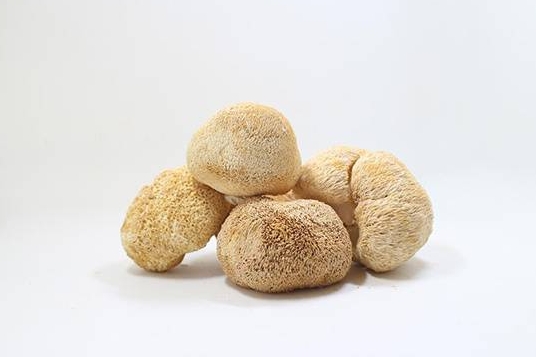General Details
Product name: Lion’s mane extract
Plant latin name: Hericium erinaceus (Bull.) Pers.
Product specifications: Polysaccharides ≥3%, ≥20%, ≥30%; Beta-glucan ≥18%, ≥20%, ≥25%; Triterpenoid saponins ≥1%, ≥2%
Appearance: Brown powder
The extract of Lion’s mane is obtained by collecting, washing, and drying the fruiting bodies of Hericium erinaceus, and then extracting them with pure water or ethanol as the solvent.
Main Ingredients
Polysaccharides
Lion’s mane(Hericium erinaceus) polysaccharide is a macromolecular compound mainly composed of monosaccharides such as glucose, galactose, and mannose. These monosaccharides are connected through glycosidic bonds to form different branched structures. The molecular weight varies depending on extraction methods and varieties and other factors, generally ranging from tens of thousands to millions of Daltons.
The terpenoid compounds in Lion’s mane include various types such as monoterpenes and sesquiterpenes. These compounds have complex cyclic structures and usually contain carbon-hydrogen elements and some functional groups such as hydroxyl and carbonyl groups. For example, erinacine A in Lion’s mane belongs to terpenoid compounds.
Sterol Substances
It mainly includes ergosterol. Ergosterol is a plant sterol. Its chemical structure is similar to that of cholesterol, with a four-ring structure, a hydroxyl group at the C – 3 position, a double bond between C – 5 and C – 6, and a side chain at the C – 17 position.
Proteins and Amino Acids
Lion’s mane is rich in protein, with a content of about 16% – 20%. It also contains all the eight essential amino acids for the human body, with complete varieties and appropriate proportions. These proteins are formed by connecting a variety of amino acids through peptide bonds, and their amino acid sequences and spatial structures determine the functions of the proteins.
Minerals and Vitamins
Lion’s mane contains mineral elements such as calcium, phosphorus, iron, and potassium. These minerals exist in the form of ions or combined with other compounds. For example, calcium can exist in the form of calcium carbonate. At the same time, it also contains B – vitamins (including vitamins B1, B2, B6, etc.), vitamin C, vitamin E, etc. Vitamins are a class of organic compounds, each with different chemical structures and functions.
Health Benefits
Digestive System
Lion’s mane extract has a very good protective and regulatory effect on the digestive system. It can promote gastric juice secretion, enhance the barrier function of the gastric mucosa, help repair damaged gastric mucosa, and has a certain auxiliary therapeutic effect on gastric diseases such as gastritis and gastric ulcers. The mechanism of action may stimulate the activity of some beneficial cells in the gastric mucosa and promote mucus secretion, thereby reducing the irritation of gastric acid and other substances on the gastric mucosa.
Learn more in this article How Lion’s Mane Benefits the Digestive Tract
Nervous System
 Lion’s mane extract contains some components beneficial to the nervous system, such as Hericium erinaceus polysaccharides. These components may help improve brain function and enhance memory and attention. In some studies, it has been found that Lion’s mane extract may have a certain alleviating effect on nervous system diseases such as neurasthenia. It can regulate the excitability of the nervous system and keep human nerve activity relatively balanced.
Lion’s mane extract contains some components beneficial to the nervous system, such as Hericium erinaceus polysaccharides. These components may help improve brain function and enhance memory and attention. In some studies, it has been found that Lion’s mane extract may have a certain alleviating effect on nervous system diseases such as neurasthenia. It can regulate the excitability of the nervous system and keep human nerve activity relatively balanced.
Learn more in this article The Neurological Benefits of Lion’s Mane Extract
Immune Regulation
The polysaccharide component in Lion’s mane has immune regulatory functions. It can activate human immune cells, such as macrophages, T lymphocytes, etc., enhance the body’s immunity, and help the human body resist the invasion of external pathogens. By stimulating the immune system, the body can recognize and eliminate pathogens faster, thereby reducing the occurrence of diseases.
Applications
Treatment of Digestive System Diseases
The polysaccharide component in Lion’s mane extract can protect the gastric mucosa and is used to treat diseases such as gastritis and gastric ulcers. It can stimulate gastric mucosal cells to secrete mucus, forming a protective film to prevent the erosion of gastric mucosa by gastric acid and other substances. At the same time, it can also promote the repair of gastric mucosa and enhance the barrier function of gastric mucosa. For example, in some stomach medicine formulations, Lion’s mane extract will be added to improve the therapeutic effect of the drug.
Adjuvant Treatment of Nervous System
Diseases For nervous system problems such as neurasthenia and insomnia, Lion’s mane extract may have a certain adjuvant therapeutic effect. The components it contains can regulate the balance of neurotransmitters, such as increasing the synthesis of serotonin, which helps relieve anxiety and depression emotions and improve sleep quality. In addition, in the research on neurodegenerative diseases (such as Alzheimer’s disease and Parkinson’s disease), it is found that Lion’s mane extract has potential neuroprotective effects and may delay the progression of diseases through mechanisms such as antioxidation and anti-inflammation.
Immunomodulatory Drug Components
The polysaccharides terpenoids and other components in Lion’s mane extract can activate immune cells such as macrophages, T lymphocytes, and NK cells, and enhance the body’s immunity. In the research and development of some immunomodulatory drugs or health products, Lion’s mane extract is used as an important raw material to improve the body’s disease resistance and prevent and treat some diseases caused by low immunity, such as colds and influenza.
Immune-Enhancing Health Products
Health products with Lion’s mane extract as the main ingredient are very common in the market. These health products mainly utilize the immunomodulatory function of Lion’s mane extract to help consumers enhance their immunity. They usually exist in the form of capsules, tablets, or oral liquids, which are convenient for people to take. Long-term use of such health products helps maintain the balance of the body’s immune system and reduces the occurrence of diseases.
body’s immune system and reduces the occurrence of diseases.
Health Products for Improving Cognitive Function
Given the beneficial effects of Lion’s mane extract on the nervous system, some health products also focus on improving cognitive function. For middle-aged and elderly people, these products may help improve memory, attention, and thinking ability. For example, by promoting the growth and connection of neurons and improving the blood circulation of the brain, the purpose of improving cognitive function is achieved.
Gastrointestinal Health Care Products
Lion’s mane extract is also widely used in health products for gastrointestinal health care. It can regulate the intestinal flora, promote the growth of beneficial bacteria, and inhibit the reproduction of harmful bacteria, thereby improving intestinal function. At the same time, it also has a certain help in relieving gastrointestinal discomfort such as indigestion and constipation. Such health products can be used as daily gastrointestinal care products to help people maintain a good gastrointestinal state.
Functional Food Additive Ingredients
Lion’s mane extract can be used as an additive ingredient for functional foods. Adding Lion’s mane extract to some beverages and dairy products endows the products with healthcare functions. For example, adding Lion’s mane extract to yogurt can not only increase the nutritional value of yogurt but also use its function of regulating intestinal flora to make yogurt have better health care effects. Lion’s mane extract can also be added to some nutrition bars, cereal breakfasts, and other foods to enhance the health attributes of products.
Related Articles

